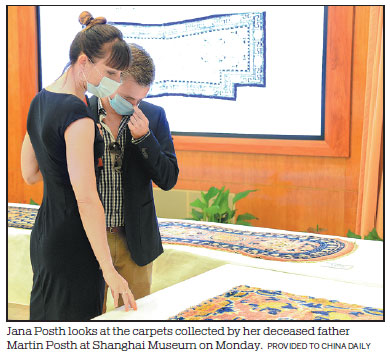Shanghai inherits man's carpet collection
Twenty-two years after he was named an honorary citizen of Shanghai, Martin Posth gave back to the city 45 Chinese antique carpets from his lifelong collection.
Shanghai Museum hosted a ceremony on Monday to receive the posthumous donation of carpets from the family of Posth.
Posth's collection comprised many precious pieces in excellent condition, said Yang Zhigang, director of Shanghai Museum, at the ceremony. An expert in art history and researcher of carpets and tapestry of ancient Anatolia, the peninsula of land that today constitutes the Asian portion of Turkey, Posth had also compiled a series of books on the subject. Donations also included these books, Yang said.
The 45 carpets are diverse in shape, pattern and style. Some of these are used for seats and horseback, for Buddhism and Taoism rituals, and cushions.
There are also pieces that feature imperial palace art, with patterns of dragon and waves in the ocean or river, as well as those of auspicious meanings of longevity, good fortune and harmony, said Yu Ying, a researcher with Shanghai Museum. "Posth viewed Shanghai as his second home; we are greatly honored to be the new home for his collection of Chinese carpets. These carpets will largely enrich Shanghai Museum's collection related to the Belt and Road countries."
Posth (1944-2017) was a founding member of the Shanghai Volkswagen Automobile Co Ltd, and was the president of Volkswagen Asia and Pacific. In 1997, he was named an honorary citizen of Shanghai for his outstanding achievements in Sino-German exchange.
Posth spent most of his spare time since the 1980s in collecting and studying antique carpets from Anatolia and China. He presented exhibitions, and published books on tapestry and carpets of Anatolia. In 2017, he spoke about donating his collection of China-themed carpets to Shanghai, but died on Sept 17 before he could realize his wish.
Posth first came to China in 1984 for the establishment of the Shanghai Volkswagen. "He was attracted by rich culture and art of China," said Jana, his daughter, at the ceremony. Being named an honorary citizen of Shanghai made him proud, as he was the first German to get this title, said Jana. "It would have made him extremely happy and proud, knowing his collection of Chinese carpets is now a part of the collection at Shanghai Museum."
She went on to recall how her father developed interest in ancient tapestry.
In 1977, Posth went to Istanbul, Turkey, to take care of the legacy of his deceased uncle who had a huge collection of antique carpets.
Istanbul, one of the main points of trade on the ancient Silk Road, is also an important center for tapestry art. It was from here that Posth began to build his own collection of carpets in 1985, Jana said.
Posth visited Tibet autonomous region in 1988 and bought the first Chinese carpet on Barkhor Street in Lhasa. Since then, he has bought many tapestries and carpets, mainly those made in Ningxia Hui autonomous region and Tibet autonomous region, with a few from the Inner Mongolia autonomous region.
A frequent visitor to Shanghai Museum, Posth used to speak highly of the collection and management of the museum, Jana said.
Posth incorporated into his will his wish to donate 45 Chinese carpets to the museum. In August 2018, his family held talks with officials at the cultural office of Chinese Embassy in Berlin, Germany.
A team of scholars from Shanghai Museum, accompanied by Chen Ping, the cultural attache to Chinese Embassy, visited Berlin to meet Katharina, the widow of Posth, and his daughters from a previous marriage, Jana and Alexa, and made arrangements for the donation.
zhangkun@chinadaily.com.cn

(China Daily Global 06/28/2019 page4)


















